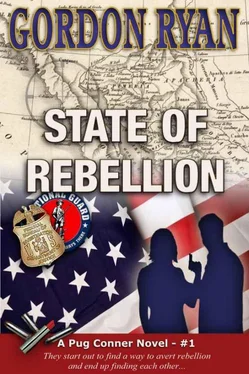Gordon Ryan - State of Rebellion
Здесь есть возможность читать онлайн «Gordon Ryan - State of Rebellion» весь текст электронной книги совершенно бесплатно (целиком полную версию без сокращений). В некоторых случаях можно слушать аудио, скачать через торрент в формате fb2 и присутствует краткое содержание. Жанр: Триллер, на английском языке. Описание произведения, (предисловие) а так же отзывы посетителей доступны на портале библиотеки ЛибКат.
- Название:State of Rebellion
- Автор:
- Жанр:
- Год:неизвестен
- ISBN:нет данных
- Рейтинг книги:4 / 5. Голосов: 1
-
Избранное:Добавить в избранное
- Отзывы:
-
Ваша оценка:
- 80
- 1
- 2
- 3
- 4
- 5
State of Rebellion: краткое содержание, описание и аннотация
Предлагаем к чтению аннотацию, описание, краткое содержание или предисловие (зависит от того, что написал сам автор книги «State of Rebellion»). Если вы не нашли необходимую информацию о книге — напишите в комментариях, мы постараемся отыскать её.
State of Rebellion — читать онлайн бесплатно полную книгу (весь текст) целиком
Ниже представлен текст книги, разбитый по страницам. Система сохранения места последней прочитанной страницы, позволяет с удобством читать онлайн бесплатно книгу «State of Rebellion», без необходимости каждый раз заново искать на чём Вы остановились. Поставьте закладку, и сможете в любой момент перейти на страницу, на которой закончили чтение.
Интервал:
Закладка:
Jim asked the man across the table for the salt, then leaned over to whisper in Dan’s ear.
“It’s quickly becoming a true rebellion.”
Dan shook his head in disbelief and began to eat, thinking about Jim’s comment and Roger Dahlgren’s implied threat. For the next twenty minutes he bantered with the Bank of America branch manager, feigning concern about the rising interest rates and the price of oil.
At 12:45, the program chairman once again brought the room to order and waited for conversation and the clanking of dinnerware to die down before he spoke.
“Members and invited guests, it is my distinct pleasure to open today’s forum and to welcome our distinguished guest. For eighteen years, Senator Malcolm Turner has served as California’s voice in the United States Senate. For six years before that, he served us well as a representative in the House. Many explosive issues have come and gone during his congressional tenure. Senator Turner has taken a stance on each, relative to his understanding of where Californians stood. But perhaps, in this latest movement, Senator Turner faces his greatest challenge. Indeed, perhaps all California faces its greatest test. Let’s hear what he has to say. Ladies and gentlemen, allow me to introduce to you the man who may well be the first president-or perhaps even prime minister-of the Republic of California, Senator Malcolm Turner.”
A few of the Rotarians and their guests immediately stood in applause. Others, some less enthusiastically, joined them in standing as Turner rose from his seat at the head table and stepped to the podium. He took his place behind the lectern, confident, smiling warmly, acknowledging old friends in the room and nodding to new faces. Malcolm Turner looked very much the part of a U.S. senator. His artificially dark hair was immaculately coiffed. He wore a dark-blue suit, starched white shirt, and a bold, California bear flag tie. Smiling, he accepted their welcome, then raised his manicured hands to quell the generous applause.
As the audience took their seats, the senator looked around the crowded room. Attendance was up by a third, given the multitude of guests and media representatives. Nearly a hundred people were jammed into tight quarters. With the tables filled, some had taken their lunch on their laps and were seated on chairs lining the walls.
After the room quieted, Turner stood silent for a moment, allowing the tension to build slightly. Here in Woodland-in the heart of an agricultural county burdened by myriad federal regulations-he knew he had a sympathetic audience.
“Mr. Mayor, members of the Yolo County Board of Supervisors, Woodland City Council members, Rotarians, and honored guests: In 1958, during Eisenhower’s presidency, my father brought me to Woodland to the Yolo County Fair. I was home from college for the summer, and Dad wanted me to see some of the exhibits, as well as to participate in the business discussions he had scheduled with local farmers. It was my first introduction into the business end of farming, outside of the countless hours I had spent in our fields near Modesto. There may well be some of you in the room today who recall the glory days of the California farmer. And most of you will also recall eighteen months ago, when I first proposed consideration of California becoming a sovereign nation. To me, it seems like only yesterday. .”
Chapter 6
Sea Ranch
Ninety-five miles north of San Francisco, California
January, 2010
It was election year, and Senator Malcolm Turner had put out the call for campaign contributions as he began his run for a fourth term in the U.S. Senate. The invitation to meet with John Henry Franklin at his palatial estate three hours’ drive north of San Francisco had been a welcome surprise. Their meeting changed Turner’s campaign rhetoric from politics-as-usual hyperbole to a more deadly indictment of federal intervention into state’s rights. Franklin’s retreat, called Sea Ranch Estate, sprawled over an area of about twelve miles, north to south, and running east from the coast nearly nine miles, well into the coastal mountain range. With its proximity to the route followed by California gray whales heading north to Alaska from Baja, the northern California coastline was a favorite gathering place for whale watchers, Greenpeace supporters, rabid environmentalists, and assorted tourists. Providing public access to the beaches across his land and a healthy contribution to ocean environmentalist causes was a concession Franklin made to placate those who might otherwise resent the size of his holdings. Access to the developed area of Franklin’s retreat and to his elaborate estate, however, was electronically restricted.
Launching his campaign for reelection, Senator Turner had put out the word, and the usual corporate sponsors had responded. But in his three previous senatorial election campaigns, he had not been contacted by John Henry Franklin, nor, to his knowledge, had he received any contributions from the Franklin Foundation. So, this unexpected invitation to Sea Ranch was as intriguing as the messenger was beautiful and alluring. Delivered at that time and in that manner made it an invitation Turner could hardly decline.
Amelia Erickson, Franklin’s personal assistant and the woman who had visited the Senator’s office to extend the invitation, came out of the mansion as Turner’s limousine came to a stop.
She extended her hand. “Senator Turner, how kind of you to come.”
“Thank you, Ms. Erickson,” Turner replied, flashing his warmest campaign smile.
She linked her arm in his and turned toward the monstrous stone house. “Let me introduce you to the other guests.”
Three men stood near the veranda railing where they had been watching the sunset gather over the ocean. As Amelia and Turner approached, the younger of the men stepped forward to greet him.
“Welcome, Senator Turner. Please, join us.”
Turner recognized him as Paul Spackman, the evening news anchor for CBS Television’s San Francisco affiliate. He didn’t recognize the other two men, both Hispanic. Spackman made the introductions.
“General Emiliano Estaban Valdez, deputy chief of staff of the Mexican Armed Forces, and General Rodrigo Cordoba, retired. General Cordoba now serves as the Chief of Federal Police in Mexico.”
Turner shook hands then accepted a drink brought to him by a uniformed servant. “Gentlemen.” He raised his glass. “To your health.”
“ Gracias, Senor . It is an honor to meet you, Senator,” General Valdez replied.
“The pleasure is mine, General.”
“I’ve just spoken with Mr. Franklin,” Amelia said, once introductions had been accomplished. “His helicopter is about ten minutes out. Please, make yourselves comfortable, and I’ll alert the staff to prepare for his arrival.”
The massive stone fireplace was fully ablaze, and the liquor sideboard in use as John Henry Franklin entered the room. Muscular, about five-feet-ten, Franklin exuded power as much from his physical presence as from his well-earned reputation for being able to resuscitate a business deal others had written off as moribund. While his outward presentation was always pleasant and courteous, Franklin had found it useful to carefully cultivate a questionable business reputation that his friends and enemies had come to call “Frankevelian.”
Though he never had been formally charged, a feeling prevailed that those who stood in the way of his interests frequently met with misfortune. On the other hand, his business interests seemed always to be blessed by the fortunate oversight of Providence.
Over the years, Franklin had acquired controlling interests in many companies, but it wasn’t until he cornered the market in communications-specifically cable TV and telecommunications systems-that he really became a major player, elevating himself to a position of near absolute power. By linking home shopping networks and cable television systems, he had gained direct-dial accessibility to millions of homes across the nation. Through these, he had garnered credit card information, personal data, and by means of extensive surveys, a sophisticated demographic data base that he used to market to a wide assortment of family needs-and in fact, to create those needs.
Читать дальшеИнтервал:
Закладка:
Похожие книги на «State of Rebellion»
Представляем Вашему вниманию похожие книги на «State of Rebellion» списком для выбора. Мы отобрали схожую по названию и смыслу литературу в надежде предоставить читателям больше вариантов отыскать новые, интересные, ещё непрочитанные произведения.
Обсуждение, отзывы о книге «State of Rebellion» и просто собственные мнения читателей. Оставьте ваши комментарии, напишите, что Вы думаете о произведении, его смысле или главных героях. Укажите что конкретно понравилось, а что нет, и почему Вы так считаете.












